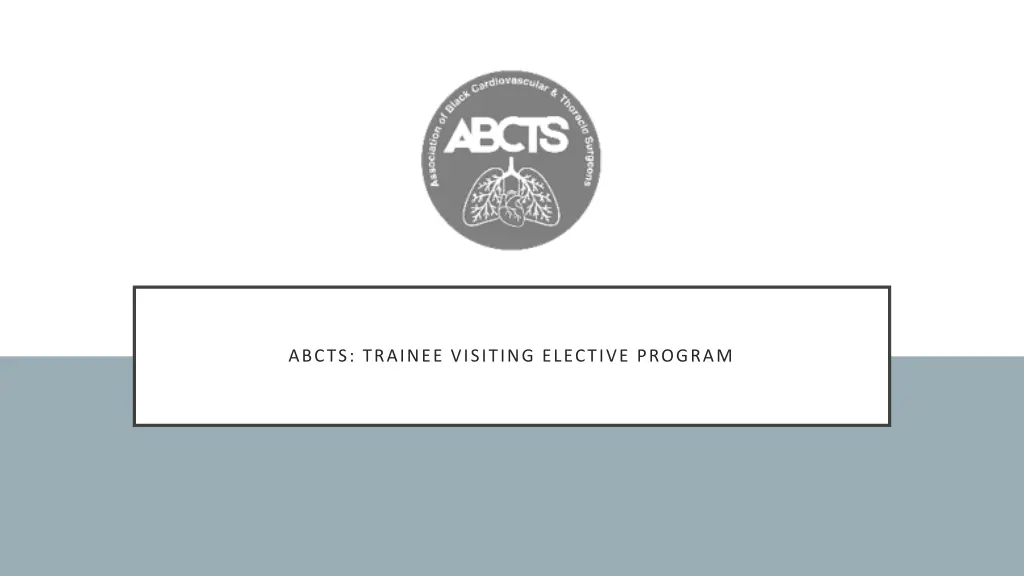
Cardiothoracic Surgery Training Programs Overview
Explore details about the ABCTS Visiting Elective Program, mission, goals, challenges, and the underrepresentation of Black Cardiothoracic Surgeons. Learn about the organization's aim to promote diversity and excellence in Cardiothoracic Surgery.
Download Presentation

Please find below an Image/Link to download the presentation.
The content on the website is provided AS IS for your information and personal use only. It may not be sold, licensed, or shared on other websites without obtaining consent from the author. If you encounter any issues during the download, it is possible that the publisher has removed the file from their server.
You are allowed to download the files provided on this website for personal or commercial use, subject to the condition that they are used lawfully. All files are the property of their respective owners.
The content on the website is provided AS IS for your information and personal use only. It may not be sold, licensed, or shared on other websites without obtaining consent from the author.
E N D
Presentation Transcript
ABCTS: WHO WE ARE A 501c3 non-profit organization Our members include Cardiac, General Thoracic, and Congenital Surgeons practicing in both the academic and non-academic setting Among our group are over 100 faculty, active trainees and medical students pursuing a career in Cardiothoracic Surgery
MISSION To be leaders of excellence that advocate for under-represented surgeons in our specialty and the advancement of care for under- represented patients
ABCTS: OUR GOALS Refinement: Promote professional and intellectual exchange among under-represented Cardiothoracic Surgeons and our colleagues Representation: Increase the representation of under-represented surgeons in our specialty Role Models: Provide direct mentorship of junior surgeons, trainees, and medical students pursuing Cardiothoracic Surgery Research: Encourage and assist surgeons in conducting original research addressing health disparities endured by under-represented patients with Cardiovascular and Thoracic disease
Black Cardiothoracic surgeons are considerably underrepresented relative to the communities our specialty cares for, representing an estimated 2% of the Society of Thoracic Surgeons. This number is lower in the academic setting The representation of Black Women Cardiac surgeons is nearly non-existent. THE CHALLENGE We serve an increasingly diverse population of patients with CV health needs. Daunting task? CTS training requires a 6 10-year commitment something that may discourage people who are interested. Early exposure to CTS pivotal for recruitment to field
CARDIAC AND THORACIC SURGERY CARDIAC THORACIC Subspecialities: Adult, Congenital, Heart Failure Subspecialities: General Thoracic and Thoracic Oncology, Transplant Primary pathologies managed: Primary pathologies managed: Heart Failure Lung Cancer Coronary Artery Disease Esophageal Cancer Valve Disease Mediastinal diseases Transplant Lung Transplant Endovascular surgery
CURRENT CT SURGERY TRAINING PATHWAYS TRADITIONAL PATHWAY I-6 PROGRAM 4 + 3 PROGRAM Relatively novel; first programs established in 2008 After medical school, complete 5 years of general surgery Medical students apply to general surgery program with a 4+3 track Applicants apply directly to cardiothoracic surgery residency Apply after 3rd clinical year Apply for a residency position in cardiothoracic surgery during PGY4 clinical year Residents continue having exposure to the different fields of surgery before deciding on cardiothoracic surgery Competitive match process 47 first year I6 spots in 2022 31% match rate Complete 2-3 years of CT surgery residency CTS training completed at same institution as general surgery Must demonstrate commitment to the field (research, letters, clinical experiences)
WHAT WE PROPOSE: ABCTS PIPELINE PROGRAM A visiting rotation where awardees will spend 1 week to 1 month at academic institutions Goals: Build relationships with surgical mentors Enhance exposure to Cardiothoracic Surgery Increase the strength of applications Anticipated outcomes: Successful pairing of awardees with STS member hosts at academic institutions Submitted applications to the NMRP for a Thoracic surgery training program by awardees Successful match into Thoracic Surgery training programs by awardees.
HOST INSTITUTIONS Brigham and Women s Hospital (Boston, MA) Stanford University (Palo Alto, CA) Ohio State (Columbus, OH) University of Maryland (Baltimore, MD) University California-Davis (Sacramento, CA)
APPLICATION REQUIREMENTS 1) CV 2) Essay delineating your interest in CT Surgery (500 words or less), and 3) An Endorsement/Letter of Support from their Program Director or Faculty member (highlighting good standing, technical skills, professionalism, etc).
ADDITIONAL INFORMATION APPLICATION DEADLINE: January 20, 2025 Rotations should be completed during the months of: May - September 2025 You have to apply to the institution/meet their requirements Up to $5000 stipend for the travel to cover travel, accommodations, etc
CONTACT INFORMATION: (QUESTIONS, APPLICATIONS) ABCTSpipeline@gmail.com
